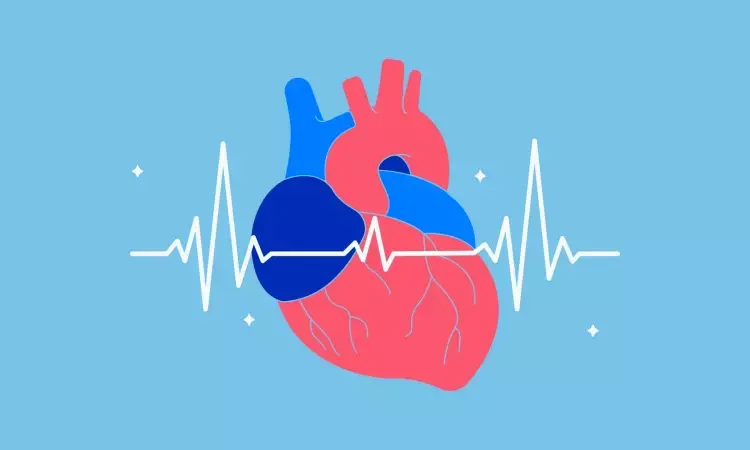- Home
- Medical news & Guidelines
- Anesthesiology
- Cardiology and CTVS
- Critical Care
- Dentistry
- Dermatology
- Diabetes and Endocrinology
- ENT
- Gastroenterology
- Medicine
- Nephrology
- Neurology
- Obstretics-Gynaecology
- Oncology
- Ophthalmology
- Orthopaedics
- Pediatrics-Neonatology
- Psychiatry
- Pulmonology
- Radiology
- Surgery
- Urology
- Laboratory Medicine
- Diet
- Nursing
- Paramedical
- Physiotherapy
- Health news
- Fact Check
- Bone Health Fact Check
- Brain Health Fact Check
- Cancer Related Fact Check
- Child Care Fact Check
- Dental and oral health fact check
- Diabetes and metabolic health fact check
- Diet and Nutrition Fact Check
- Eye and ENT Care Fact Check
- Fitness fact check
- Gut health fact check
- Heart health fact check
- Kidney health fact check
- Medical education fact check
- Men's health fact check
- Respiratory fact check
- Skin and hair care fact check
- Vaccine and Immunization fact check
- Women's health fact check
- AYUSH
- State News
- Andaman and Nicobar Islands
- Andhra Pradesh
- Arunachal Pradesh
- Assam
- Bihar
- Chandigarh
- Chattisgarh
- Dadra and Nagar Haveli
- Daman and Diu
- Delhi
- Goa
- Gujarat
- Haryana
- Himachal Pradesh
- Jammu & Kashmir
- Jharkhand
- Karnataka
- Kerala
- Ladakh
- Lakshadweep
- Madhya Pradesh
- Maharashtra
- Manipur
- Meghalaya
- Mizoram
- Nagaland
- Odisha
- Puducherry
- Punjab
- Rajasthan
- Sikkim
- Tamil Nadu
- Telangana
- Tripura
- Uttar Pradesh
- Uttrakhand
- West Bengal
- Medical Education
- Industry
Poorly controlled blood sugar tied to lower heart rate variability in diabetes patients: Study

South Korea: A recent study published in Frontiers in Cardiovascular Medicine has shown an independent association between poorly controlled glucose levels and lower heart rate variability (HRV) in patients with diabetes mellitus (DM). This was further substantiated by the independent continuous association between real-time hyperglycemia measurements and lower HRV.
"These data strongly suggest that cardiac autonomic dysfunction is caused by increased levels of blood sugar," the researchers wrote. Cardiac autonomic dysfunction is a complication of diabetes that carries an about fivefold increased risk of mortality in adults.
The amount by which HRV was lower in diabetes patients with TIR < 70% (compared to those with TIR > 70%) was about 2/3 in both the time and frequency domains.
Autonomic neuropathy occurs commonly as a long-term complication of diabetes and can be diagnosed based on HRV, calculated from electrocardiogram (ECG) recordings. Heart rate variability is the fluctuation in the time interval between adjacent heartbeats.
Limited research has been done on HRV using real-time ECG and ambulatory glucose monitoring in diabetes patients. Sung Il Im, Kosin University College of Medicine, Busan, Republic of Korea, and colleagues, therefore, aimed to investigate real-time HRV according to ambulatory glucose levels in diabetic patients.
For this purpose, the researchers included 43 patients (66.3 ± 7.5 years) with diabetes mellitus. They underwent continuous real-time ECG monitoring (225.7 ± 107.3 h) for HRV and ambulatory glucose monitoring using a remote monitoring system. HRV was compared according to the ambulatory glucose profile. Data analysis was done according to the target in the glucose range (TIR).
The study revealed the following findings:
- There were no significant differences in the baseline characteristics of the patients according to the TIR.
- During monitoring, ECG and ambulatory glucose levels (a total of 15,090 times) were checked simultaneously for all patients.
- Both time- and frequency-domain HRVs were lower when the patients had poorly controlled glucose levels (TIR < 70%) compared with well-controlled glucose levels (TIR > 70%).
- Heart and respiratory rates increased with real-time glucose levels.
"Our results support the concept that cardiac autonomic dysfunction occurs when poorly controlled glucose levels are measured in real-time before checking long-term glucose level predictors such as C-peptide levels and HbA1c may play a role in the development of cardiovascular diseases earlier in the course of type 2 diabetes," the researchers wrote.
"These data strongly indicate that cardiac autonomic dysfunction is caused by increased blood sugar levels," they concluded.
Reference:
Im, S. I., Kim, S. J., Bae, S. H., Kim, B. J., Heo, J. H., Kwon, S. K., Cho, S. P., Shim, H., Park, J. H., Kim, H. S., & Oak, C. H. (2023). Real-time heart rate variability according to ambulatory glucose profile in patients with diabetes mellitus. Frontiers in Cardiovascular Medicine, 10, 1249709. https://doi.org/10.3389/fcvm.2023.1249709
Dr Kamal Kant Kohli-MBBS, DTCD- a chest specialist with more than 30 years of practice and a flair for writing clinical articles, Dr Kamal Kant Kohli joined Medical Dialogues as a Chief Editor of Medical News. Besides writing articles, as an editor, he proofreads and verifies all the medical content published on Medical Dialogues including those coming from journals, studies,medical conferences,guidelines etc. Email: drkohli@medicaldialogues.in. Contact no. 011-43720751


